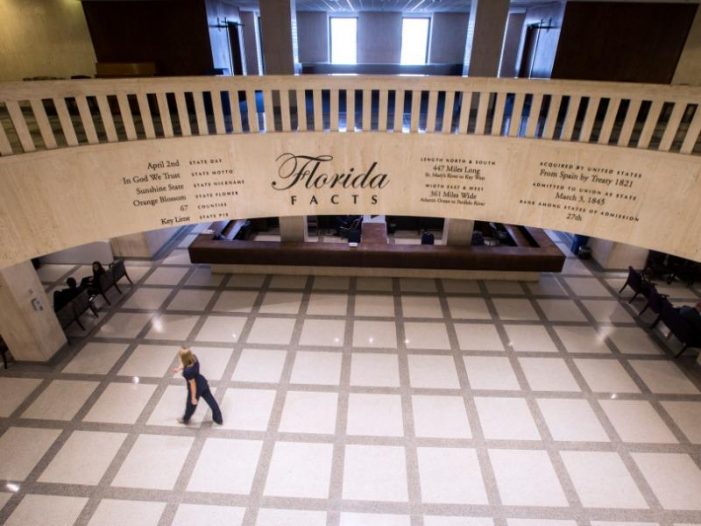By Ana Ceballos, The News Service of Florida
TALLAHASSEE — As a new year begins, and as we bid a final farewell to the past decade, Floridians should look out for a number of events in the next 12 months.
For starters, two massive events are coming to the Sunshine State: the 2020 Super Bowl and WrestleMania. Those events are expected to draw huge crowds to Miami in February and Tampa in April — not to mention Shakira and Jennifer Lopez.
But the biggest events this year will revolve around politics.
President Donald Trump’s chances of winning re-election in November will run through Florida, a state that has historically been decided by thin margins.
Before the Nov. 3 general election, the president’s Democratic rivals are gradually starting to build operations in the state as they try to sway voters ahead of the March 17 presidential primary.
It remains to be seen how many Democratic candidates will still be in the race after the early caucuses and primaries and Super Tuesday. But the nomination likely will still be in play when Florida Democrats go to the polls.
While most of this year’s attention will focus on the presidential race, Florida won’t have high-profile statewide elections for governor or U.S. senator. But the state will have plenty of other contests in the coming months.
The upcoming retirements of Republicans Ted Yoho and Francis Rooney have opened congressional seats in two deep-red districts: District 3 in North Florida and District 19 in Southwest Florida. Republican primaries in both districts are expected to get crowded.
Democrats are also trying to cut down on the 23-17 advantage Republicans hold in the Florida Senate. Democratic leaders hope to flip Senate District 39, a swing seat in Miami-Dade and Monroe counties, and Senate District 9, which is in Seminole and Volusia counties.
But Democrats also will have to play some defense.
Senate Republicans are using a large war chest to protect their seats and to possibly target District 37, which is held by Sen. Jose Javier Rodriguez, D-Miami.
In November, voters will also get a say on proposed constitutional amendments, including one that would gradually raise the state’s minimum wage to $15 an hour, a proposal largely bankrolled by Orlando trial attorney John Morgan.
Floridians also might get a chance to decide if they want to overhaul the state’s primary-election system. A proposed ballot measure would allow registered voters to cast ballots in primary elections regardless of party affiliation — a major change from the longstanding “closed” party primaries. Under the ballot measure, the two candidates getting the most votes in each primary would advance to the general election.
Another event that will greatly impact the state this year will be the 2020 U.S. Census. The results of that are expected to boost Florida’s numbers in the U.S. Capitol and set the stage for redrawing the state’s legislative and congressional districts ahead of the 2022 elections.
A NUMBERS GAME
Florida’s population growth remains on track to pick up additional congressional seats in the coming years, though the state might not be adding new residents as fast as officials had believed.
U.S. Census Bureau estimates released on Monday show the Sunshine State has added roughly 640 people a day over the past year. State officials have often cited an estimate of 900 new residents a day.
Regardless, the new estimates should bolster the case for Florida expanding its U.S. House delegation after the 2020 Census. Early projections have indicated Florida’s swelling population likely will push the Sunshine State’s delegation from 27 to 29 members.
Every 10 years, the distribution of congressional seats across the country is adjusted based on population changes, with some states gaining seats and others losing or remaining the same.
Florida’s estimated population stood at just under 21.48 million as of July 1, a nearly 1.1 percent increase from a year earlier, according to the Census Bureau’s national and state population figures released Monday.
POT BACKERS FIGHT TO GET ON THE BALLOT
Supporters of a proposed constitutional amendment that would legalize recreational marijuana want more time to get on the November ballot.
Arguing that a new law violated constitutional rights, the political committee Make It Legal Florida filed a lawsuit Tuesday seeking additional time to submit petition signatures to get on the ballot.
The committee is targeting the constitutionality of a 2019 law (HB 5) that placed more restrictions on signature gathering, contending it has hampered the recreational marijuana measure.
Under the law, petition gatherers need to register with the Department of State and receive petition forms from the agency. Make It Legal Florida argues the department’s registration database has had continual problems, and as a result, has affected the committee’s ability to submit signatures in time to meet a Feb. 1 deadline.
Petitions are submitted to county election supervisors, who verify the signature and report the information to the secretary of state.
Sponsors of the proposed measure need to submit 766,200 valid signatures. As of mid-day Friday, the state had tallied 232,236 valid petition signatures from Make it Legal Florida, according to the Division of Elections website.
STORY OF THE WEEK: Florida could pick up two additional congressional seats after the 2020 U.S. Census, according to early projections.
QUOTE OF THE WEEK: “Well, we definitely think it ought to be Florida.” — Dale Ketcham, Space Florida’s vice president of government and external relations, on the state’s hunt to land the command center for the nation’s newest military branch, Space Force.


TRUMP 2020 & REPUBLICANS 2020.